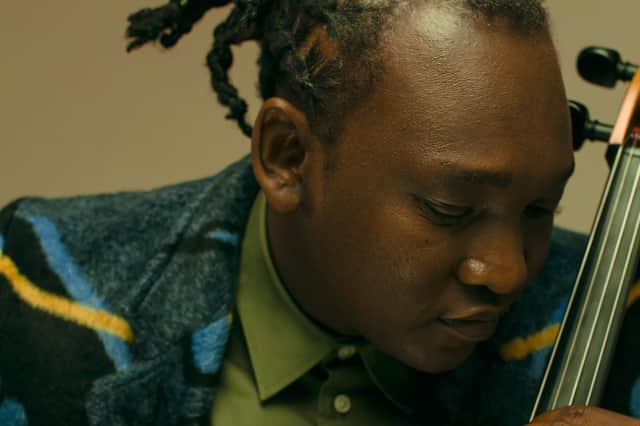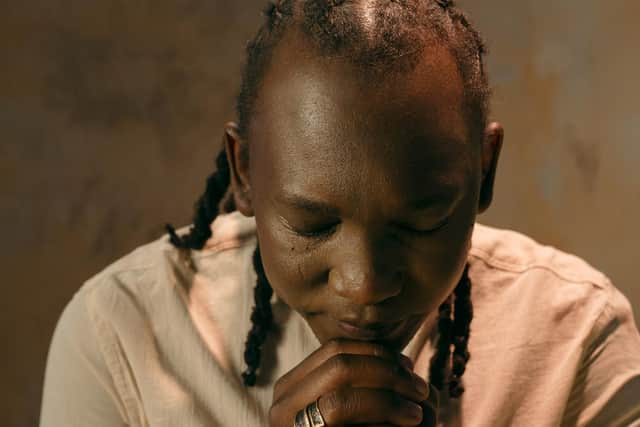Abel Selaocoe: 'I'm a contemporary of my influences'


Talking to The Yorkshire Post via video call, the 31-year-old musician says he doesn't see himself as "in between" traditions. "If you think about DNA, the way it's formed, it's got different facets to it but it's one whole thing," he says. "I think that's what I am, I'm a contemporary of my influences.
"I'm a contemporary of a learned cellist who dedicated his life to learning classical music, but also an African child who grew up with parents who were so keen on understanding the soul of our ancestors. So I just grew up with a combination, rather than I came up with it a bit later. I think maybe the exploration and understanding of it grew, especially in my college days."
Advertisement
Hide AdAdvertisement
Hide AdHis debut album for Warner Classics, Where Is Home (Hae Ke Kae), released to widespread acclaim last year, is "actually made of those components", he says of a record that places 18th century works by JS Bach and Giovanni Benedetto Platti alongside his own compositions. "It's a mixture of influences of where I come from and what I am," he explains.
This month Selaocoe is touring the UK with his new group, the Bantu Ensemble, taking classical music out of traditional concert halls. "It's very exciting because we're doing this in collaboration with Through The Noise and we're doing quite unusual places that the cello doesn't usually fit in," he says.
Performing at venues such as Stylus at the University of Leeds, which more commonly hosts rock and pop gigs, "takes down the barrier that this instrument is only played in these kinds of acoustically manufactured places like a concert hall with this amount of ring", he says. The challenge, he believes, is to "recreate a home for the cello" in clubs. "I love doing that," he says.
The concert programme for this tour further develops the theme of Where Is Home. "I feel like the way things have gone repertoire-wise is that there's new music being written but there's also previous music being used," he says. "The idea of throwing the Baroque into this kind of space is exciting for me, and mixing it with the African is also very exciting, so we're going to be playing extremely rhythmic music but going in between the lyrical world of Baroque music and African super-rhythm."
Advertisement
Hide AdAdvertisement
Hide AdSelacaoe likes to sing during his performances. "I don't only like it, it's all I do most of the time," he says. "It's such a beautiful way to get to the audience because I think they relate to it so well, and then especially when I start to mix playing cello and singing at the same time, it sometimes feels almost like one instrument rather than two different instruments."


This year has been a busy one for the cellist. As well as supporting Ludovico Einaudi, he has performed in New York for the launch of Apple Music's Classical app. "I was named an ambassador for the Classical app, that was in collaboration with Carnegie Hall, but actually we did it at an Apple store in 5th Ave, and that was really cool too – again, the cello going to another space and commanding to be heard. Since then I've developed a really great relationship with Carnegie and I'll be going back to play my debut in the actual hall."
In addition, Selaocoe has been working with the BBC National Orchestra of Wales and the BBC Singers. "I'm enjoying it because all of these are residencies," he says. "At this moment in time I have a residency with the BBC National Orchestra of Wales for the next three years, so I'll be going back and forth coming up with new projects. Also, I'm an associate artist with the BBC Singers.
"It's all about thinking about what needs to be reflected at this time about where classical music is going and what it's mixing with and how to keep it alive. How we present it is super important, so that's the exploration and journey that I've been going through with these two groups. We played at Milton Court doing Rachmaninov Vespers but also South African church music and somehow there was beautiful coherence between those two things because we discovered that we use four-part harmony in some of the most similar ways, so there's a thread that really binds everything together.
Advertisement
Hide AdAdvertisement
Hide Ad"When it comes to residences, it's about a feeling of searching for this identity all the time and allowing that to be the result, rather than searching and finding a goal of what to be like. It's really fun to come up with interesting projects."
Amidst everything, Selaocoe has composed two new concertos. The first was Four Spirits, which he premiered with the BBC Scottish Symphony Orchestra, and will revive with the London Symphony Orchestra at the Barbican. The latter is part of the London Jazz Festival and the cellist's spotlight artist residency on the South Bank.
"It's for solo voice and solo cello and orchestra, there's also African percussion within the mix. It's really very exciting because it's basically a very African concept: the pillars of community which keep people up, especially where I come from in Sebokeng. It's composed of four movements of four spirits which keep the place up and I've written around this, but it's also a symphonic expression and a classical collaboration, if you like, of this kind of thing."
The second piece is a double concerto for kora and cello, co-written with Seikou Keita and Barak Schmool. Selaocoe says he's "100 per cent" interested in broadening the cello's repertoire. "I hope that other students or professionals will be willing to put their stamp on some of this music," he says. "At the moment people are still a bit tentative to try to use the voice and the cello at the same time, but actually that is a growing phenomenon within the world of improvised music concerning the cello. Now there's so many musicians that are connected from so far away between West Africa and there's so many kora players in the UK, I can see this piece happening again and again. I love playing this piece with Seikou; we kind of wrote it as a map of our friendship, we just sat and improvised for maybe three hours and recorded it and then started to take out the most important bits and began to sculpt a piece from that."
Advertisement
Hide AdAdvertisement
Hide AdBorn shortly after anti-apartheid campaigner Nelson Mandela was released from prison, Selaocoe was heavily inspired both by township traditions and the legacy that Mandela left behind. "I think for me the first thing is following the lineage, understanding where it came from," he says. "Our parents were quite insistent on teaching us our customs at home. It was hugely important for my dad especially to go, 'how do you slaughter a cow and why do you do it?', why do you call your uncles to come on a certain day, how do we do grief? Taking that into current life was very important for them to pass on.
"And then talking about the legacy that people like Mandela have created, is that we now have an opportunity to explore a mixture of unusual things because suddenly we have access to the combination of cultures that has happened so naturally in South Africa. South Africa is one of those places that is so unique in how the cultures have simply melded together and have stayed together. Even things like Cape Malay, how the food is made incredibly African but incredibly Malay, it seems part of the DNA to be people that combine things in a natural way, or have grown up with a combination of things and letting that manifest into sound or into life itself."
Growing up in the township of Sebokeng, south of Johannesburg, Selaocoe did not even have a cello at home when he was first learning to play the instrument. Instead, he would visualise finger placement and learn by ear. "Again, this legacy of combining cultures or this DIY feeling, we had to find a way around poverty or not having the resources," he says. "First and foremost, it started with imagination, imitating all the time. The things we saw on TV we bodily imitated and played like children, and then after a while you source material like books and you listen to as much music as possible.
"And the first thing that came was to learn things by ear. If I could sing it, I could play it. So we would learn concertos and sing them and we enjoyed that. It's like learning a pop song, how you sing all the lyrics would be a little bit like that, and when we got the opportunity to hold an instrument we would begin to experiment. Actually experimentation has always been at the heart of this; your imagination tells you something and you try to put it onto the cello, no matter what it is. It didn't matter if it was classical or not."
Advertisement
Hide AdAdvertisement
Hide AdSelaocoe won a scholarship to St John's College in Johannesburg, which he says he "loved" but also found "very difficult because it was a new world with new philosophies, much more Western", but it enabled him to take a greater leap of faith by moving to England to study at the Royal Northern College of Music in Manchester. He says: "For me, Manchester was about laying the foundations of playing my instrument really well. I spent so much time doing the simplest things with my teachers in order to make it so natural in my body, if I wanted to say something then I wouldn't struggle physically when I play the cello.
"The other side of it was an endless exploration of what other people are listening to. I discovered so much music. I only heard of Earth Wind & Fire and Bill Frisell when I arrived in the UK. I even started listening to Schnittke concerto grossos. All this crazy music that I was not privy to in South Africa. I had this opportunity to open my mind towards it and not even judge it, just be around it. It was super great."
Of Manchester itself, he says: "I'm so glad that I didn't go to London. It was cold and friendly. There was a keenness for friendships when I arrived, but maybe I was particularly lucky at that time. I wasn't lost, that's for sure, and I was lucky to have a great teacher. Wherever you go, whatever environment you enter, it's all about the individuals that nature presents to you and what you do with that. The people that I ended up spending time with really sculpted the way I am today."
Abel Selaocoe and the Bantu Ensemble play at Leeds University Stylus on Saturday November 4. https://www.abelselaocoe.com/